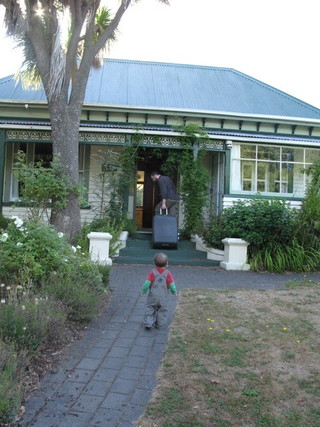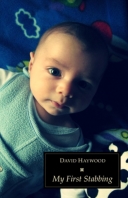Adding everything up, I recently calculated that Bob-the-baby has lived at 33 different addresses during his first eighteen months. The only constant in his life -- apart from his parents -- has been the small draw-string bag that contains his toys.
Each morning there is a ritual opening of the toy-bag. Bob gloatingly inspects his vehicles, and then painstakingly arranges them into formation: concrete mixer, helicopter, 'mummy' fire engine, 'baby' fire-engine, and blue aeroplane.
Next his farmyard animals greet the new day: cow, sheep, pig, stegosaurus (not really a farmyard animal, I suppose), and a plastic statuette of a Marks & Spencer's shop-girl. Each of the animals gets a kiss from Bob before being placed lovingly on the floor. The Marks & Spencer's girl often gets several kisses.
As you might expect, the animals require more tending than the vehicles. At meal-times, each animal must be offered food before Bob-the-baby will consent to dine. And if any are inadvertently missed -- for some odd reason, I often forget the sheep -- then there are terrible howls of anguish from Bob, who clearly believes that they might starve to death. In fact, such is his concern for their nutritional well-being, that he recently offered the stegosaurus to Jennifer with the words: "Mummy breast-feed dinosaur". (Jennifer declined, saying that she didn't think it appropriate to breast-feed animals from a different taxonomic class).
I suspect that our nomadic lifestyle has given Bob-the-baby a strange impression of earthly existence. Every few weeks we move to a different city. His father takes him wandering about the streets, and invariably gets lost for several hours. Sometimes it is very hot, sometimes it snows, sometimes everyone else speaks a different language. In some countries (for example, England) they hate children; in other countries (for example, Scotland) they automatically give you chocolate. "Plenary" and "visiting professor" are essential vocabulary for everyday life.
Happily, in each place, Bob has managed to find something that he really enjoys. In New York City, he fell in love with Central Park. He was entranced by the Die Welt balloon in Berlin. The child-hatred of the English was mitigated by the endless entertainment of the double-decker bus. And the gun at Edinburgh Castle (fired daily at one o'clock in the afternoon) was always received with a round of heartfelt applause.
This last item caused us some stress -- possibly at 1.00 pm, Edinburgh time -- as we waited in the immigration queue at San Francisco airport. "Where's the gun," said Bob suddenly. "Where is it?" Then very loudly: "Bang! Bang! WHERE'S THE GUN?" Fortunately, none of the security staff so much as raised an eyebrow. It is, I suppose, entirely normal behaviour for children in America.
In Palo Alto, our motel smelled as if a dead body had been stashed in the ceiling. We didn't care. For the first time in months we were seeing actual sunlight. A few days previously in Edinburgh, I'd briefly glimpsed the midday sun, but it hardly provided more warmth or light than the moon. Here you could actually feel it on your skin. Bob and I wandered outside in our shirtsleeves, marvelling at the warmth. The Californians walking past us on the footpath were dressed in ankle-length woollen overcoats.
We took advantage of the Stanford free bus to visit the highlights of Palo Alto. Bob had difficulty adjusting to the concept of a single-decker, and spent nearly the entirety of each journey chanting: "Go upstairs, Daddy!" In the playgrounds of Palo Alto, the mothers conversed in whispers about the economy: "Kevin has been made redundant"; "Paul's been put on a four-day week"; "We've decided to go back to Kentucky -- at least we'll have family there".
There was a long queue outside the emergency relief truck. I was reminded of the Road Runner cartoons -- when Wile E. Coyote runs unwittingly over the edge of a cliff, but remains suspended in mid-air until the moment when he looks down, and realizes the ground has gone. A couple of people were wearing creased office clothes, and that same stunned expression. In this case, of course, their bewildered faces asked: "Where's the money gone?"
After a fortnight of Californian winter, I told Bob: "Tomorrow we're going back to New Zealand."
"Zealand?"
"The country where we usually live. Where Bob's house is."
That night, Bob slept fitfully between us. Every so often, he would murmur: "Bob's house?" At one point, he was so close that I was woken by his breath on my cheek. Later on, he decided to sleep at right-angles to his parents, with his hair poking onto my pillow. It was like having someone rub a tennis-ball against my face. Restlessly, he flipped over, and his sharp little toenails stabbed into my forehead.
We'd forgotten how nice the staff of an airline can be. Air New Zealand even provided a nanny (or rather, manny) to help with children. God bless that man; he was wonderful. My only complaint is that his parents had named him Beauregard -- which meant that I spent the next fourteen hours singing I'm Beauregard from Dixie, Hooray! For your enlightenment, here are all of the song's words that I was eventually able to recall.
I'm Beauregard from Dixie! Hooray! Hooray!
During the flight, as I endlessly repeated the above lyric, Bob demonstrated his ability to bark whenever he saw a picture of a dog. In theory, this doesn't sound so bad. In practice, Bob insisted on watching the film One Hundred and One Dalmatians. Jennifer said that, from her perspective, it seemed like a very long journey.
It was still dark when we changed planes in Auckland. The sun rose as we flew over Canterbury. Bob and I peered out the window into the dawn: distant mountains, green and yellow plains, a braided river, clumps of cabbage trees, an infinite blue sky.
Somewhere, far below us, Bob's house was waiting.
Addendum: Just after we returned to New Zealand, I was interviewed by Kim Hill on National Radio. If you're interested, you can listen to it here.

